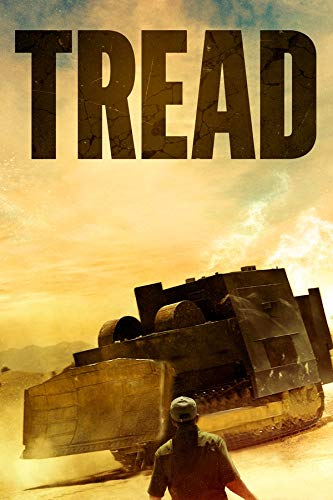
Written by Ram Venkat Srikar
Tread is more of a cinematic recreation of real events than a documentary. It’s so cinematic that if it wasn’t a true story it would have been a perfect revenge thriller. It’s what I would call the marriage of tragedy and a vigilante revenge thriller. Marvin Heemeyer, the subject, is treated as the tragic hero with a proper hero’s arc. All he wants is a peaceful life free of hurdles but when the world throws hindrances at him and keeps doing that for over 13 years, it’s time for the working-class hero to pick up his weapon and fight back.
Early in the ’90s, Marvin moved to Granby, Colorado, a close-knit rural town. There he purchases a piece of land, establishes a muffler shop, and settles down with his girlfriend. We are also shown how close the people in this town are with a citizen even saying how your neighbor knows little more about you here compared to a neighbor who would know if you live in a city. However, Marvin always feels like an outsider. We also see how simple and beautiful life can be. Over the years, the man makes a lot of great friendships. He meets his girlfriend Trisha in Granby, who says she always felt safe when she was with him. A friend of his recalls that he never heard anyone speak ill of Marvin; we don’t either. His love for his craft, which is welding, amazes his friends. Between snowmobiling in winter, to spending time with his girlfriend and friends, life was indeed beautiful but the happy times come to an end when his land runs into legal disputes.
The crux of the dispute is Cody, a native businessman who has ties with the Thompson family, the most powerful family of the town which also happens to have a say in the government decisions. With Cody trying to grab Marvin’s land, Marvin finds himself helpless at the bottom of the power spectrum. Recordings of mass audio descriptions where he talks about how he is being suppressed by the powerful play parallel to the narrative. He loses many legal battles and with time he loses his patience too. All of this trauma is captured with recreated scenes and interviews with people involved. It is a conventional documentary structure. At times, I even wondered how exponentially higher would the effect be had it been a full-fledged cinematic narrative. Even with its current treatment, which is very close to the equivalent of a revenge drama, it is effectively aided by dramatic music, which adds to the emotions like anger, happiness, and sadness. Irritated, disturbed, and oppressed, Marvin goes on a rampage through the town that kept him suppressing for over 13 years. It is a literal rampage with a bulldozer that he customized to be the destructive devil with his own hands for over two years.
For most of the runtime, the film keeps justifying or should I say informing us of the back story that pushed an ordinary man to take the drastic action that he has taken. Yes, without a question, what Marvin has done is a crime in legal terms. But behind such unexpected reactions is a story, which is often ignored. The film exerts more on the back story than the actual events because it is obvious that everyone knows the reaction but quite a few are aware of what triggered the reaction. In this case, it’s not something that was triggered in a second, it is years of anger bursting out in the most dramatic fashion, and it is shockingly real. The film makes effective use of Marvin’s recordings, to give us a peek into his state of mind as he transpires through one turbulence while subsequently elapsing into other. Even the conclusive stretch, where the 63-ton bulldozer warrs through the streets of the town, is reenacted by combining the audio clippings, news footage, and testaments from the witnesses of the destruction. Although the story is told in the third person, Marvin’s recordings balance these external judgments and observations. What might seem to be a usual discussion to the third person could mean more to the person in the discussion. Since we get to know his feelings directly from the man himself, it lets us empathize much more with him.
Although it feels like it takes sides, Tread is a moderately neutral documentary. It tells that Marvin had the option to not choose what he ultimately chose. He could have shunned what he did but we also know how far was the man pushed which led him to make the choice. There lies the beauty of the film – you know that he could have withdrawn, but at the same time, you also know that the man cannot dodge it. It is a mental dilemma for both Marvin and us and sadly, there is nothing neither Marvin nor we can do.
Paul Solet’s Tread is a captivating cinematic recreation of a real tragedy that raises above mere recreation and puts us in the mental state of the subject. It also questions whether Marvin is the only one complicit of his actions. It is up to you, though, to answer this.